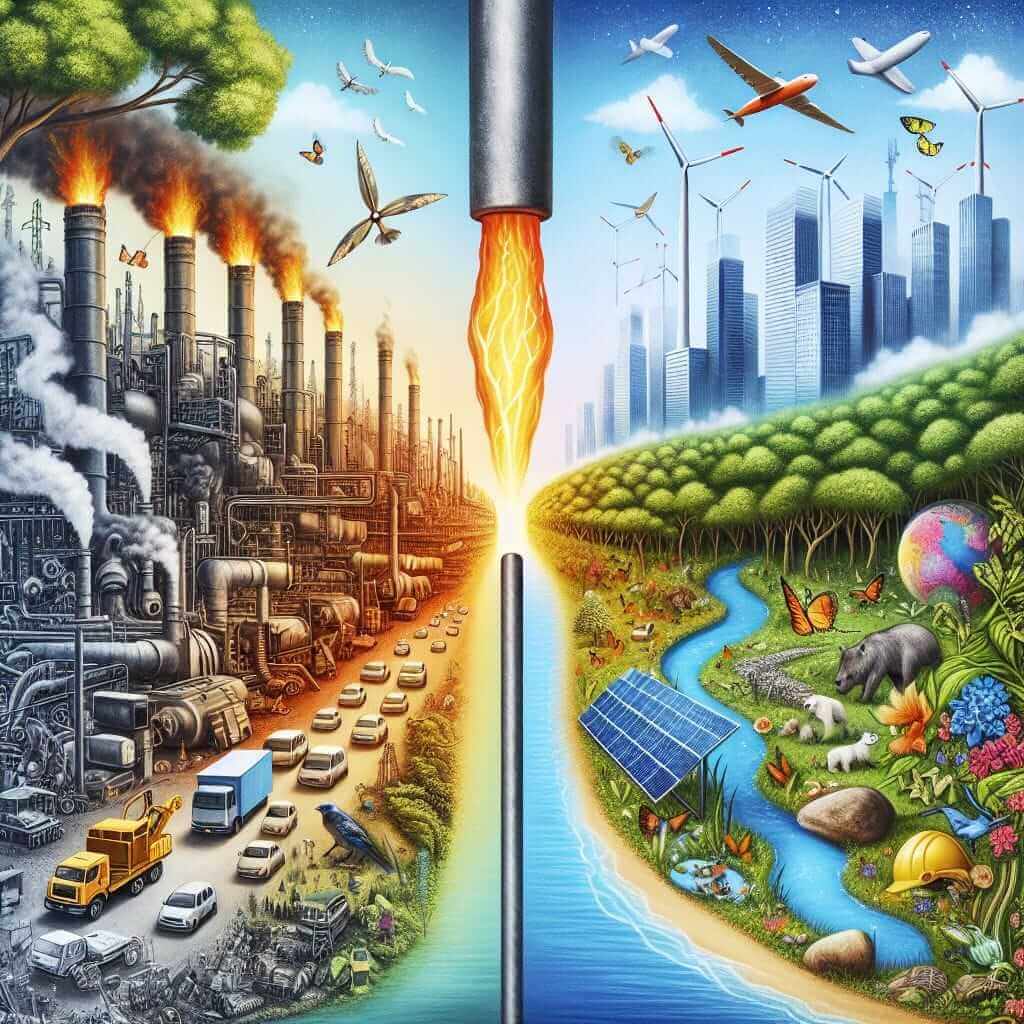The topic “The effects of economic growth on environmental sustainability” is becoming increasingly relevant in the context of global development. With more students encountering this kind of subject matter in IELTS exams, it is essential to understand how to approach and write essays regarding the delicate balance between economic progression and environmental preservation. This article aims to offer insights on how to construct a compelling essay that aligns with IELTS writing task requirements.
Nội dung bài viết
Potential Essay Prompts
- “Economic development is essential for improving living standards, but it may come at the cost of environmental sustainability. Discuss both views and give your own opinion.”
- “To what extent do you agree or disagree with the following statement: Economic growth invariably leads to environmental degradation.”
- “Some people believe that the benefits of economic growth outweigh the potential damage to the environment. Discuss the extent to which you agree or disagree with this opinion.”
An Analysis of a Selected Essay Prompt
Selected Prompt
“To what extent do you agree or disagree with the following statement: Economic growth invariably leads to environmental degradation.”
Prompt Analysis
This is an opinion essay that requires you to agree or disagree with the assertion that economic growth always results in environmental damage. To approach this prompt effectively, you should:
- Define your stance clearly — whether you agree, disagree, or hold a balanced view.
- Present arguments and counterarguments.
- Use examples to support your points.
- Ensure your essay is cohesive, with clear transitions between points.
Sample Essay
Title: Economic Growth and Environmental Sustainability: Finding a Balance
Economic growth and environmental sustainability are two objectives that often seem to be in conflict. While some people argue that economic growth inevitably leads to environmental degradation, I disagree with this view. With proper policies and sustainable practices, economic development can go hand in hand with environmental preservation.
Firstly, it is crucial to recognize that economic growth can provide the resources needed for environmental conservation. As countries become wealthier, they can invest more in cleaner technologies and renewable energy sources. For example, Scandinavian countries, which have high GDP per capita, invest significantly in green technologies and have some of the lowest carbon footprints per capita. This demonstrates that with adequate financial resources, it is feasible to reduce environmental damage while maintaining economic growth.

Secondly, the notion that economic growth invariably leads to environmental degradation does not account for advancements in sustainable practices. Innovations in green technology and more stringent environmental regulations have allowed many industries to operate sustainably. For instance, the adoption of circular economy practices—where resources are reused, recycled, and reclaimed—has been essential in reducing waste and minimizing environmental impact. This shows that sustainable development is possible with the right incentives and innovations.
However, it is also essential to acknowledge that unregulated and unchecked economic growth can lead to significant environmental harm. Developing countries, in their quest for rapid industrialization, often exploit natural resources unsustainably, leading to deforestation, pollution, and loss of biodiversity. Therefore, it is crucial for governments to implement and enforce environmental regulations that ensure economic activities do not jeopardize the ecosystem.
In conclusion, while unrestrained economic growth can harm the environment, it is not an inevitable outcome. Through the adoption of sustainable practices and technologies, economic development can coexist with environmental sustainability. Therefore, I disagree with the assertion that economic growth invariably leads to environmental degradation.
(Word count: 300)
Tips for Writing
Vocabulary and Grammar
-
Vocabulary:
- Economic growth (n) /ˌɛkəˈnɑːmɪk ɡroʊθ/
- Degradation (n) /ˌdɛɡrəˈdeɪʃən/
- Sustainability (n) /səˌsteɪnəˈbɪlɪti/
- Innovation (n) /ˌɪnəˈveɪʃən/
- Circular economy (n) /ˈsɜːrkjələr ɪˌkɑːnəmi/
-
Grammar:
- Ensure cohesive devices (e.g., firstly, secondly, for example, in conclusion) are used properly to link your ideas.
- Maintain subject-verb agreement and consistency in verb tenses.
- Use passive voice where appropriate to emphasize actions over actors (e.g., “It is crucial to recognize…”).
Advanced Vocabulary in Context
- Degradation (n) /ˌdɛɡrəˈdeɪʃən/: The process of something becoming worse.
- “Economic growth cannot remain unchecked without leading to environmental degradation.“
- Sustainability (n) /səˌsteɪnəˈbɪlɪti/: The ability to be maintained at a certain rate or level without depletion.
- “Adopting renewable energy is essential for long-term sustainability.“
- Innovation (n) /ˌɪnəˈveɪʃən/: The action or process of innovating.
- “Innovations in technology can significantly mitigate environmental damage.“
- Circular economy (n) /ˈsɜːrkjələr ɪˌkɑːnəmi/: An economic system aimed at minimizing waste and making the most of resources.
- “The circular economy model is crucial for reducing industrial waste.“
- Biodiversity (n) /ˌbaɪoʊdaɪˈvɜːrsɪti/: The variety of plant and animal life in a particular habitat.
- “Economic activities should not compromise the biodiversity of an ecosystem.“
Conclusion
Understanding the dynamic between economic growth and environmental sustainability is integral for a high-scoring IELTS essay. By addressing various perspectives and incorporating evidence and examples, students can develop a well-rounded argument. Practicing with different prompts related to this topic and using diverse vocabulary will significantly refine writing skills for the IELTS exam.
For further reading on related topics, explore these articles:
- The effects of climate change on global politics
- The role of government policy in promoting renewable energy
By diving into these resources and understanding their implications, students can better prepare for similar questions in their IELTS Writing Task 2.